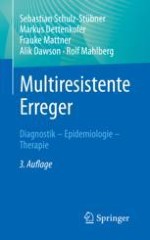Zusammenfassung
Multiresistente Erreger stellen ein zunehmendes therapeutisches und sozioökonomisches Problem im Gesundheitswesen dar. Zur Eindämmung dieses Problems sind gesundheitspolitische Weichenstellungen, Aufklärung der Öffentlichkeit, Schulung des medizinischen Personals und koordinierte Forschungsanstrengungen erforderlich. Die praktischen Säulen der Prävention von Resistenzentwicklung und -verbreitung ruhen auf dem zielgerichteten, sparsamen Verbrauch von Antibiotika in Human- und Veterinärmedizin, konsequenter Standard-/Basishygiene und allgemeinem Problembewusst sein.











